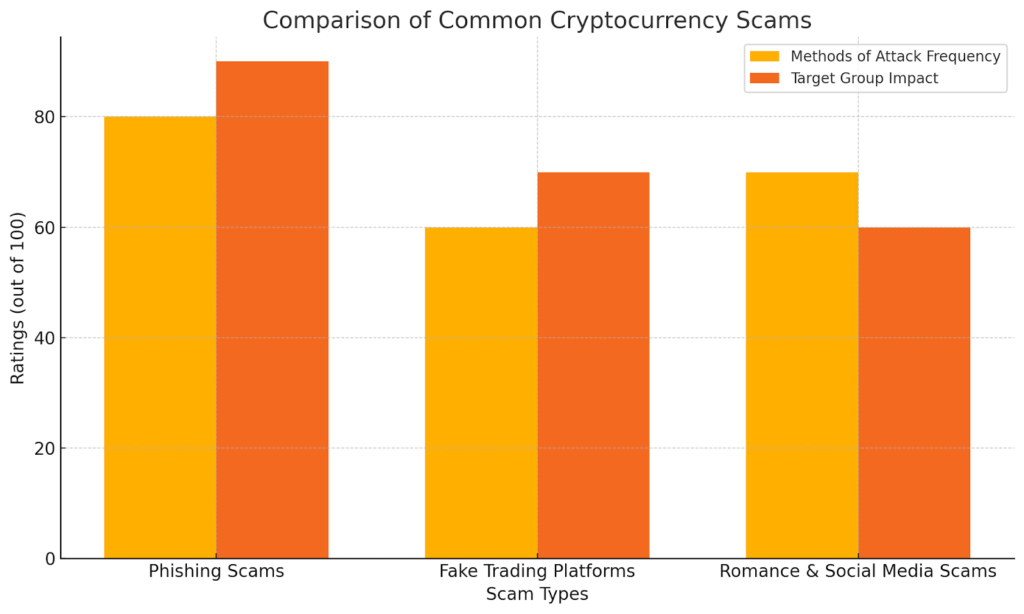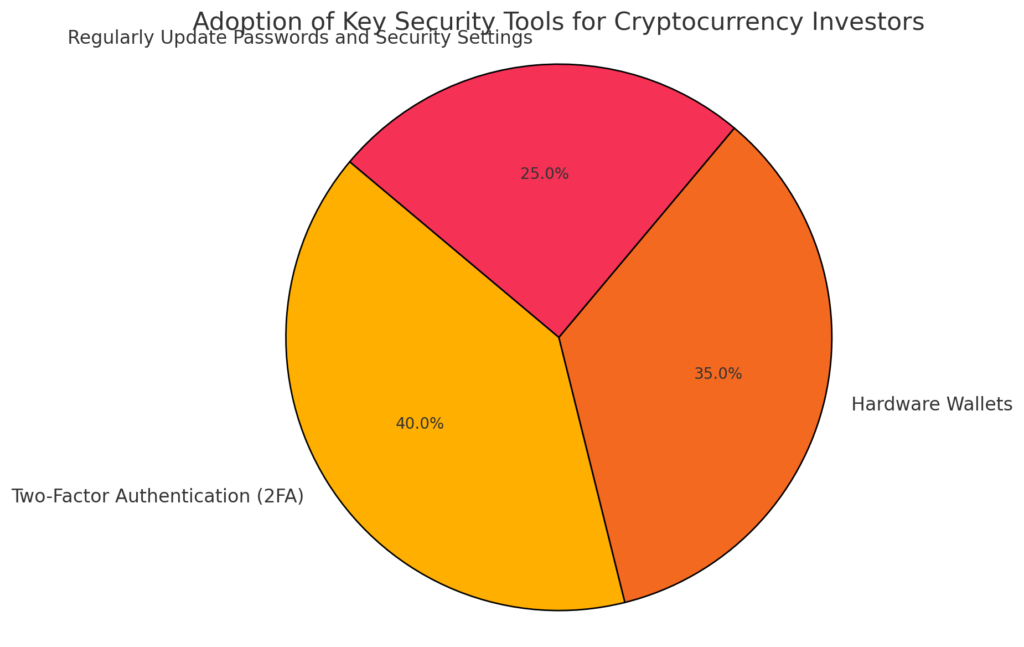Avoiding cryptocurrency scams is crucial for anyone involved in the crypto space. Scams are evolving swiftly. They target users with phishing, fake trading platforms, and romance scams. This guide will help you understand these scams and offer ways to protect yourself and your investments. As crypto goes mainstream, we must be vigilant to avoid scams.
Recognizing Common Cryptocurrency Scams
Cryptocurrency scams are on the rise. They exploit the unregulated, decentralized nature of crypto assets. Scammers leverage these vulnerabilities and users’ lack of knowledge to commit fraud. Understanding how these scams work is crucial in preventing significant financial losses.
Phishing Scams
Phishing scams in the cryptocurrency world are common and dangerous. Scammers often create fake websites or apps that mimic legitimate exchanges or wallets. They trick users into giving their private keys or info and then steal their crypto. These attacks usually come via emails or messages that seem to be from trusted sources. Always verify website URLs. Avoid clicking on suspicious links. This helps you recognize phishing attempts and protect your information.
Fake Trading Platforms
Another prevalent scam is fake trading platforms. These platforms appear legitimate, offering high returns and smooth trading experiences. However, the scammers vanish after users deposit their funds, leaving victims with no recourse. Always check reviews and look for security certificates. Use platforms with verified histories to ensure they are legitimate. This will help you avoid unverified crypto platforms and avoiding cryptocurrency scams. Verify sources before making any deposits.
Romance and Social Media Scams
Romance scams are particularly insidious, as they prey on individuals’ emotions. Scammers build online relationships over time, often posing as romantic partners. Once they establish trust, they manipulate victims into transferring cryptocurrency. They promise to invest or multiply it. Social media scams often use fake profiles. They impersonate celebrities and influencers who promote fake crypto giveaways. To protect yourself, avoid unverified crypto platforms. For avoiding cryptocurrency scams, secure your info. Be cautious of unsolicited messages on social media.

Here is a bar chart comparing the common types of cryptocurrency scams. It visualizes two aspects:
- Target Group Impact: Shows these scams’ relative impact on their typical victims.
- This represents how scams commonly use various attack methods.
How to Safeguard Yourself Against Crypto Scams
With crypto scams becoming more advanced, precautions are vital. Be skeptical to protect your assets. Always verify any platform or offer before engaging.
Verifying Website URLs and Sources For Avoiding Cryptocurrency Scams
One of the easiest ways for scammers to deceive crypto users is through fake websites. Scammers can create URLs that look almost identical to real ones. They do this by swapping letters or adding extra characters. For example, a fake website might replace an “o” with a zero in the URL. To avoid these traps, double-check URLs before entering sensitive info. Access crypto exchanges or wallets using your browser. Don’t click links in emails or messages. Legitimate crypto websites will have strong security. They will use HTTPS and may use anti-phishing tools. These ensure you interact with the correct site.
| Legitimate Sites | Common Phishing Indicators |
| HTTPS with a padlock | HTTP without security symbols |
| No spelling errors in the URL | Misspelled URLs or extra characters |
| Verified certificates | Suspicious or unfamiliar domain names |
Avoiding High-Return Promises
Scammers lure victims with promises of quick, guaranteed returns—no legitimate investment can offer that. These offers may be from Ponzi schemes, fake ICOs, or scams. Be wary of platforms that guarantee returns or ask for large upfront investments. It is likely, not true if it sounds too good to be true. Conduct comprehensive research. Be skeptical of any platform or person making such promises.
Protecting Personal Information
Your private keys and wallet credentials are the gateway to your cryptocurrency assets. Scammers might ask for these through phishing, fake support requests, or other schemes. For avoiding cryptocurrency scams, never share your private keys or recovery phrases with anyone. You can use two-factor authentication (2FA) for extra account protection. Store your assets in secure wallets, with hardware wallets being the best option. They are offline and immune to many online attacks.
Spotting Red Flags in Crypto Investments
Cryptocurrency scams are often designed to lure investors with grand promises while hiding crucial information. Recognizing these red flags can help prevent falling victim to fraudulent schemes.
Unrealistic Return Promises
A major warning sign in crypto investments is the promise of high returns with low risk. Scams, like Ponzi and pump-and-dump schemes, use these tactics to attract new victims. In Ponzi schemes, initial investors are paid with funds from newer ones. This continues until the scheme collapses. Pump-and-dump schemes are similar. Scammers inflate a token’s price. Then, they sell their holdings for a profit. This leaves later investors with worthless assets. Be skeptical of guaranteed returns. Legitimate investments have risks. No one can promise profits.
Lack of Transparency
Another major red flag is the need for more explicit information about the project or its team. Legitimate crypto projects are transparent. They disclose their development plans, funding, and the people behind the project. Scam projects often hide vital info, making it hard to verify them. Always verify a source’s authenticity. Check the project’s whitepaper, team credentials, and community feedback. If any of this information is missing or vague, it’s likely a scam.
Coercive Tactics and Urgency
Scammers often use pressure tactics. They create a sense of urgency to rush victims into making rash decisions. They may claim a limited-time offer is about to expire. This may rush you to invest without due diligence. This urgency aims to bypass your rational thought. It makes you more likely to fall for their scheme. Be sure to take your time research, and never let anyone pressure you to make an investment decision.
Tools and Resources to Stay Safe in the Crypto Space

Staying safe in the crypto world requires using reliable tools and staying informed. With the rise of scams and fraudulent activities, you must equip yourself with the proper security measures to protect your assets.
Security Tools for Crypto Investors
To keep your cryptocurrency secure, and so avoiding cryptocurrency scams, there are several essential tools and practices that every investor should adopt:
- Enable Two-Factor Authentication (2FA). It adds security beyond your password. Use apps like Google Authenticator or Authy, which generate time-sensitive codes. This ensures that accounts are safe even with your password. A second step is needed to access them.
- For large crypto holdings, use a hardware wallet, like a Ledger or Trezor, for long-term storage. Many sources strongly recommend these wallets, which store your private keys offline, safe from hacks.
- Update your passwords and security settings regularly. Use strong, unique passwords and change them often. Tools like password managers (e.g., Bitwarden, KeePassXC) can help. They can securely manage complex passwords. Also, update your wallet and security software frequently to protect against vulnerabilities.
Education Resources for Crypto Safety

Educating yourself about the latest security threats and best practices is crucial in Avoiding Cryptocurrency Scams. Some valuable resources include:
- Trusted Websites: Websites like CoinDesk, Cointelegraph, and security-focused platforms like Norton or SwissMoney provide up-to-date information on new threats, security tips, and crypto news.
- Online Courses: Many platforms offer courses on crypto safety. They teach users to spot scams, protect their wallets, and ensure secure transactions.
- Community Forums: Join forums like Reddit’s cryptocurrency subreddit. Also, follow cybersecurity experts on Twitter. They can help you stay informed about new scams and security practices.
Reporting Scams and Suspicious Activities
If you encounter a scam or suspect fraudulent activities, it’s vital to report it immediately. Reporting scams helps protect others and raises awareness. Here’s how you can act:
- Report to Authorities: In the US, agencies like the Federal Trade Commission (FTC) and the Internet Crime Complaint Center (IC3) handle scam reports. Globally, many countries have their cryptocurrency fraud units.
- Raise Awareness in Communities: Sharing your experience with crypto communities and forums helps alert others to emerging threats. The more informed the community is, the harder it becomes for scammers to succeed.
Related Topics:
- Using exchanges securely
- Secure crypto portfolio tracking tools
- How to integrate wallets with trading platforms
- Cryptocurrency Licensing in the Philippines
- Public and Private Keys
Avoiding Cryptocurrency Scams requires vigilance, reliable tools, and ongoing education. To lower your scam risk, use security practices, such as hardware wallets, two-factor authentication, and trusted sources. Reporting suspicious activities is vital to protecting the crypto community.



















